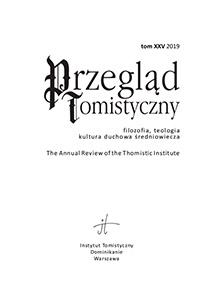MAREK GENSLER, MONIKA MANSFELD, Walter Burley’s Questions to Aristotle’s De Longitudine et Brevitate Vitae

Volume XXIV: 2018
Philosophy — Theology — Spiritual culture of the Middle Ages
ISSN 0860-0015
e-ISSN 2544-1000
SUMMARY
Walter Burley’s commentary on Aristotle’s De longitudine et brevitate vitae, one of the fruits of his regency at the faculty of Arts in Oxford, contains three questions, all closely related to the commented text. The first of them concerns the influence of climate on the length of human life. Burley opposes here Aristotle’s statement that inhabitants of hot lands live longer than those of cold lands. His own conclusion that inhabitants of lands with moderate climate live longest is drawn from another Aristotelian premise that moderate climate is best for preservation of natural humidity and hotness. The second question inquires whether fire is corruptible in its own sphere. Following Aristotle Burley asserts that everything that is having material substrate is corruptible. His own addition is pointing to the “hotness” or “coldness” of planets, the properties of which result not from their forms but powers. The third question studies the possibility of infinite duration of an individual animal if it continuously received adequate food. Burley’s reply is concordant with Aristotle’s. In his opinion, natural humidity of animals is gradually weakened because of its “rarefaction”, which results from the fact that humidity of food is less pure than natural humidity. Consequently, even though it sustains life and prolongs the animal’s ability to act, it decreases the power of natural humidity to prolong the animal’s ability to last.
